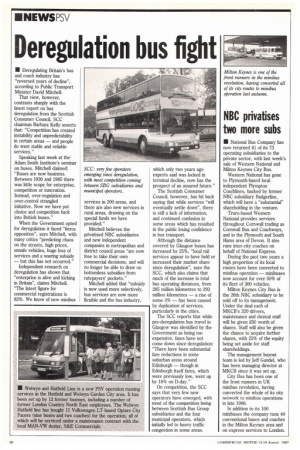Deregulation bus fight
Page 22

If you've noticed an error in this article please click here to report it so we can fix it.
• Deregulating Britain's bus and coach industry has "reversed years of decline", according to Public Transport Minister David Mitchell.
That view, however, contrasts sharply with the latest report on bus deregulation from the Scottish Consumer Council. SCC chairman Barbara Kelly asserts that: "Competition has created instability and unpredictability in certain areas — and people do want stable and reliable services."
Speaking last week at the Adam Smith Institute's seminar on buses, Mitchell claimed: "Buses are now business. Between 1930 and 1985 there was little scope for enterprise, competition or innovation. Instead, over-regulation and over-control strangled initiative. Now we have put choice and competition back into British buses."
When the Government opted for deregulation it faced "fierce opposition", says Mitchell, with many critics "predicting chaos on the streets, high prices, unsafe vehicles, huge loss of services and a soaring subsidy — but this has not occurred."
Independent research on deregulation has shown that "enterprise is alive and kicking in Britain", claims Mitchell. "The latest figure for commercial registrations is 83%. We know of new minibus services in 200 areas, and there are also new services in rural areas, drawing on the special funds we have provided."
Mitchell believes the privatised NBC subsidiaries and new independent companies in metropolitan and district council areas "are now free to take their own commercial decisions, and will no longer be able to draw on bottomless subsidies from ratepayers' pockets."
Mitchell added that "subsidy is now used more selectively, bus services are now more flexible and the bus industry, which only two years ago experts said was locked in terminal decline, now has the prospect of an assured future."
The Scottish Consumer Council, however, has hit back saying that while services "will eventually settle down", there is still a lack of information, and continued confusion in some areas which has resulted in the public losing confidence in bus transport.
Although the distance covered by Glasgow buses has increased by 25%, "local rail services appear to have held or increased their market share since deregulation", says the SCC, which also claims that much of the increase in total bus operating distances, from 285 million kilometres to 293 million kilometres — a rise of some 3% — has been caused by duplication of services, particularly in the cities.
The SCC reports that while pre-deregulation bus travel in Glasgow was identified by the Government as being too expensive, fares have not come down since deregulation: "There have been substantial fare reductions in some suburban areas around Edinburgh — though in Edinburgh itself fares, which were previously low, went up by 18% on D-day."
On competition, the SCC says that very few new operators have emerged, with most of the competition being between Scottish Bus Group subsidiaries and the four municipal operators, which initially led to heavy traffic congestion in some areas.












































































